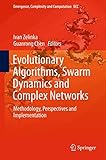Evolutionary Algorithms, Swarm Dynamics and Complex Networks [electronic resource] : Methodology, Perspectives and Implementation / edited by Ivan Zelinka, Guanrong Chen.
Contributor(s): Zelinka, Ivan [editor.] | Chen, Guanrong [editor.]
| Chen, Guanrong [editor.] | SpringerLink (Online service)
| SpringerLink (Online service) .
.
Material type:  BookSeries: Emergence, Complexity and Computation: 26Publisher: Berlin, Heidelberg : Springer Berlin Heidelberg : Imprint: Springer, 2018Edition: 1st ed. 2018.Description: XXII, 312 p. 194 illus., 155 illus. in color. online resource.Content type: text Media type: computer Carrier type: online resourceISBN: 9783662556634.Subject(s): Dynamics
BookSeries: Emergence, Complexity and Computation: 26Publisher: Berlin, Heidelberg : Springer Berlin Heidelberg : Imprint: Springer, 2018Edition: 1st ed. 2018.Description: XXII, 312 p. 194 illus., 155 illus. in color. online resource.Content type: text Media type: computer Carrier type: online resourceISBN: 9783662556634.Subject(s): DynamicsEvolutionary algorithms constitute a class of well-known algorithms, which are designed based on the Darwinian theory of evolution and Mendelian theory of heritage. They are partly based on random and partly based on deterministic principles. Due to this nature, it is challenging to predict and control its performance in solving complex nonlinear problems. Recently, the study of evolutionary dynamics is focused not only on the traditional investigations but also on the understanding and analyzing new principles, with the intention of controlling and utilizing their properties and performances toward more effective real-world applications. In this book, based on many years of intensive research of the authors, is proposing novel ideas about advancing evolutionary dynamics towards new phenomena including many new topics, even the dynamics of equivalent social networks. In fact, it includes more advanced complex networks and incorporates them with the CMLs (coupled map lattices), which are usually used for spatiotemporal complex systems simulation and analysis, based on the observation that chaos in CML can be controlled, so does evolution dynamics. All the chapter authors are, to the best of our knowledge, originators of the ideas mentioned above and researchers on evolutionary algorithms and chaotic dynamics as well as complex networks, who will provide benefits to the readers regarding modern scientific research on related subjects. .


There are no comments for this item.